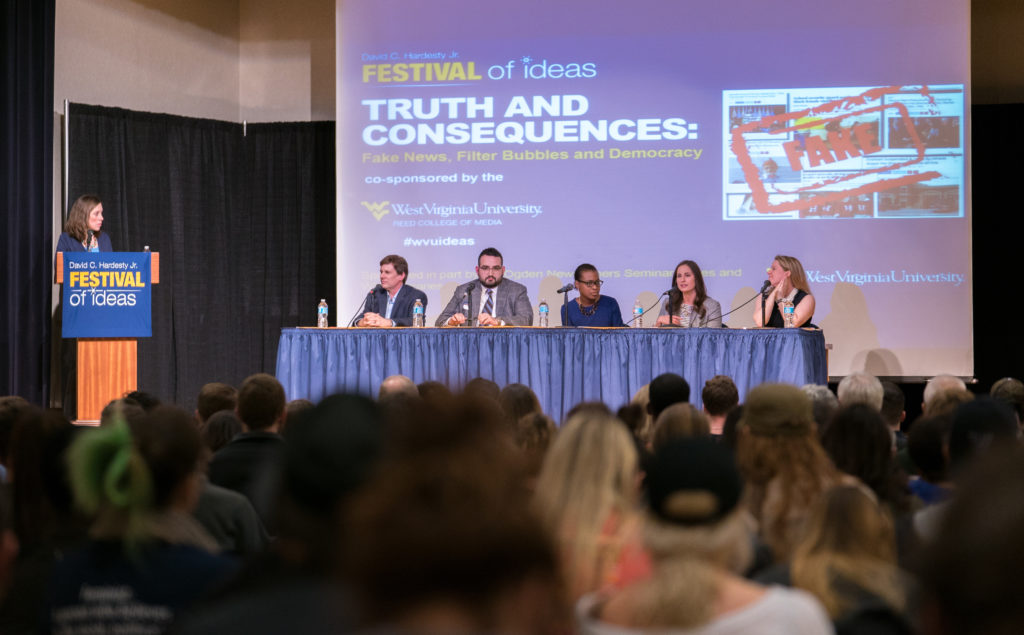By Emily Corio
Fake news is nothing new. Sensational tabloid headlines have been entertaining shoppers waiting in grocery store check-out aisles long before similar, shocking headlines started popping up in our social media feeds. What is new, though, is the proliferation of fake news online, and experts say the 2016 presidential race helped feed the fake news beast.
“We had a couple of candidates who had highly unfavorable ratings,” said David Mikkelson, founder of Snopes.com. “We also had people on the Internet discovering they could spread misinformation and rumors, not for ideological or political reasons, but because they could make money from it.”
Here are just a few fake news headlines that were circulated during the election:
“Leaked 2013 Trump tax return shows he paid over 40 million in taxes”
“FBI agent suspected in Hillary leaks found dead”
“Denzel Washington backs Trump in the most epic way possible”
On Wednesday, February 22, 2017, the David C. Hardesty Jr. Festival of Ideas and the WVU Reed College of Media co-hosted a panel discussion about fake news. “Truth and Consequences: Fake News, Filter Bubbles and Democracy” included five panelists who talked about what fake news means for democracy in the U.S. and what, if anything, should be done about it.

Panelist Zach Graves didn’t waste any time asserting that “we have a bit of a fake controversy around fake news.” Graves is the technology policy program director at the R Street Institute, a pro-free market public policy think-tank.
However, other panelists countered this point.
Errin Haines Whack, urban affairs reporter for the Associated Press (AP), said she spoke to people during the election who had read fake news stories, and she could tell those stories had resonated with them.
“What we do know is that fake news stories were shared a lot on social media,” said Whack. “What we don’t know is what kind of effect that had on the election.”
Elizabeth Cohen, assistant professor of communication studies at WVU, said that people respond to things that makes them feel strong emotions and the untrue, often sensational stories are very good at appealing to people’s emotions.
Cohen studies why people use social media and the effects social media has on people. She said it’s unlikely that one fake news story could influence how someone votes in an election, but said that the cumulative effect of fake news can have an impact.
“Over the long term, after several days of a news feed that bombards you with messages that are all similar in a basic point, you form an impression,” said Cohen.
The recent attacks by government officials, including President Trump, on mainstream news outlets, was also part of the panel discussion. Journalists on the panel said the best response to these attacks is to practice good journalism.
“What can you do, other than your job?” said Paige Lavender, senior politics editor at The Huffington Post.
“As journalists, we need to regain the public’s trust,” added Whack.
Whack also said the AP now publishes fact check stories that explain misleading or false claims and articles. These stories appear on Facebook news feeds alongside the original false or misleading content.
Another online fact-checking resource is Snopes.com. The website has debunked numerous fake news stories through critical analysis and research. Its founder, David Mikkelson, said he receives angry messages from fake news creators who say Snopes.com is hurting their ability to make money, to which he responds: “Maybe you should have a better business model than lying to people.”
A WVU journalism student in the audience asked panelists about the potential to make a lot of money from generating fake news content online compared to the starting salary of a journalist.
“You could not pay me enough to do fake news,” said Whack.
“It would be terrible for your career as a journalist to start in fake news,” Lavender added.
The panelists agreed that suppressing untrue content that purports itself as true is not the solution to combating fake news. Instead, they encourage the public to look at multiple news outlets for information and to be more critical consumers of all media content, especially before clicking on share button.
 About the Author
About the Author
Emily Corio is a teaching assistant professor at the WVU Reed College of Media at West Virginia University. She teaches courses in audio and video reporting, adventure sports reporting and using sensors as a data-collection tool for reporting. Corio served as the moderator for the panel, “Truth and Consequences: Fake News, Filter Bubbles and Democracy.”








